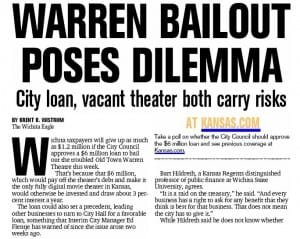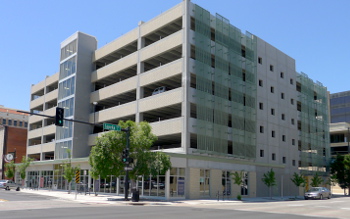Actions of the Wichita City Council have shown that campaign finance reform is needed. Citizen groups are investigating how to accomplish this needed reform, since the council has not shown interest in reforming itself.
Consider recent actions by the council and its members:
- The council voted to give a movie theater operator a no-interest and low-interest loan, after having already received the benefit of tax increment financing.
- A minister dabbling in real estate development made a large contribution to his council representative just before he asked the city council for tax increment financing.
- The council voted to give a construction company a no-bid contract for a parking garage. When later put out for competitive bid, the same company won the contract, but with a bid 21 percent less costly to taxpayers.
- Executives of a Michigan construction company made contributions to the campaign of a city council member just before and after the council voted to give the company and its local partner a huge construction contract.
- When a group of frequent campaign contributors wanted to win a contest for the right to build an apartment project, the city’s reference-checking process was a sham. City and other government officials were listed as references without their knowledge or consent, and none of the people listed as references were actually contacted.
- A frequent campaign contributor, according to the Wichita Eagle, “represented himself as an agent of the city — without the city ‘s knowledge or consent — to cut his taxes on publicly owned property he leases in the Old Town Cinema Plaza.” City officials expressed varying degrees of displeasure. But it wasn’t long before David Burk was receiving taxpayer subsidy again from the city council.
- The council voted to grant $703,017 in sales tax forgiveness to frequent campaign contributors and the mayor’s fishing buddy.

First, overpriced no-bid contracts and other giveaways to campaign contributors isn’t economic development. It’s cronyism. It’s wasteful.
Second: Citizens become cynical when they feel there is a group of insiders who get whatever they want from city hall at the expense of taxpayers. At one time newspaper editorial pages crusaded against cronyism like this. But no longer in Wichita. The Wichita Eagle has reported on some of these issues — sometimes in depth, sometimes in passing, but some have escaped notice. The editorial page of the newspaper sometimes takes notice, but is rarely critical of the council or mayor.
Third, when it is apparent that a “pay-to-play” environment exists at Wichita City Hall, it creates a toxic and corrosive political and business environment. Companies are reluctant to expand into areas where they don’t have confidence in the integrity of local government. Will I find my company bidding against a company that made bigger campaign contributions than I did? If I don’t make the right campaign contributions, will I get my zoning approved? Will my building permits be slow-walked through the approval process? Will my projects face unwarranted and harsh inspections? Will my bids be subjected to microscopic scrutiny?
Importantly: Will the Wichita city council prop up a competitor to my company with economic development incentives that place my company at severe disadvantage?

We’d also need to add — as does New Jersey law — provisions that contributions from a business owner’s spouse and children will be deemed to be from the business itself. This is because for Kansas municipal and school district elections, only personal contributions may be made. Additionally the contributions of principals, partners, officers, and directors, and their spouses and children, are considered to be from the business itself for purposes of the law. These provisions are important, as many city council members in Wichita receive campaign contributions from business owners’ family members and employees as a way to skirt our relatively small contribution limits. For two examples of how companies use family members, employees, and friends to stack up campaign contributions, see Campaign contributions show need for reform in Wichita.
Such campaign finance reform would not prohibit anyone from donating as much as they want (up to the current limits) to any candidate. Nor would the law prevent candidates from accepting campaign contributions from anyone.
This reform, however, would remove the linkage between significant contributions and voting to give money to the contributor. This would be a big step forward for Wichita, its government, and its citizens.
Proponents see three paths towards campaign finance reform. One would be to press for a law in the upcoming session of the Kansas Legislature. Such a law would be statewide in scope, and could apply to city councils, county commissions, school boards, townships, and other elective bodies.
A second path would be to use the municipal initiative process. Under this process, a group writes a proposed ordinance. Then, it collects valid signatures on petitions. If a successful petition is verified, the city council must either (a) pass the ordinance as written, or (b) set an election to let the people vote whether the ordinance should become law.
There is also a third path, which is for the Wichita City Council to recognize the desirability of campaign finance reform and pass such an ordinance on its own initiative.
If we take the affected parties at their word, this third path should face little resistance. That’s because politicians who accept these campaign contributions say it doesn’t affect their voting, and those who give the contributions say they don’t do it to influence votes.
If politicians and contributors really mean what they say, there should be no opposition to such a law. Citizens should ask the Wichita City Council to pass a campaign finance reform ordinance that prohibits voting to enrich significant campaign contributors.
Some incidents
 In 2008 the Wichita City Council approved a no- and low-interest loan to Bill Warren and his partners. Reported the Wichita Eagle: “Wichita taxpayers will give up as much as $1.2 million if the City Council approves a $6 million loan to bail out the troubled Old Town Warren Theatre this week. That’s because that $6 million, which would pay off the theater’s debt and make it the only fully digital movie theater in Kansas, would otherwise be invested and draw about 3 percent interest a year.”
In 2008 the Wichita City Council approved a no- and low-interest loan to Bill Warren and his partners. Reported the Wichita Eagle: “Wichita taxpayers will give up as much as $1.2 million if the City Council approves a $6 million loan to bail out the troubled Old Town Warren Theatre this week. That’s because that $6 million, which would pay off the theater’s debt and make it the only fully digital movie theater in Kansas, would otherwise be invested and draw about 3 percent interest a year.”
When questioned about election donations:
“I would never do anything because of a campaign contribution,” said [former council member Sharon] Fearey, who received $500 from David Burk and $500 from David Wells.
“I don’t think $500 buys a vote,” said [former council member Sue] Schlapp.
“One has nothing to do with the other,” [Wichita Mayor Carl] Brewer said.
Also in 2008, the Reverend Dr. Kevass J. Harding wanted to spruce up the Ken-Mar shopping center at 13th and Oliver, now known as Providence Square. Near the end of June, Kevass Harding and his wife contributed a total of $1,000, the maximum allowed by law, to the campaign of Wichita City Council Member Lavonta Williams (district 1, northeast Wichita). This was right before Harding appeared before the city council in July and August as an applicant for tax increment district financing (TIF).
These campaign contributions, made in the maximum amount allowable, were out of character for the Hardings. They had made very few contributions to political candidates, and they appear not to have made many since then.

But just before the Ken-Mar TIF district was to be considered for approval, the Hardings made large contributions to Williams, who is the council member representing Ken-Mar’s district. Harding would not explain why he made the contributions. Williams offered a vague and general explanation that had no substantive meaning.
In August 2011 the council voted to award Key Construction a no-bid contract to build the parking garage that is part of the Ambassador Hotel project, now known as Block One. The no-bid cost of the garage was to be $6 million, according to a letter of intent. Later the city decided to place the contract for competitive bid. Key Construction won the bidding, but for a price $1.3 million less.
The no-bid contract for the garage was just one of many subsidies and grants given to Key Construction and Dave Burk as part of the Ambassador Hotel project. In Wichita city elections, individuals may contribute up to $500 to candidates, once during the primary election and again during the general election. As you can see in this table compiled from Wichita City Council campaign finance reports, spouses often contribute as well. So it’s not uncommon to see the David and DJ Burk family contribute $2,000 to a candidate for their primary and general election campaigns. That’s a significant sum for a city council district election campaign cycle. <a href=”http://wichitaliberty.org/files/wichita-city-council-campaign-contributions-associated-with-ambassador-hotel.pdf”” target=”_blank” title=”Wichita City Council campaign contributions associated with Ambassador Hotel”>Click here for a compilation of campaign contributions made by those associated with the Ambassador Hotel project.
Council Member Jeff Longwell (district 5, west and northwest Wichita), in his second term as council member, led the pack in accepting campaign contributions from parties associated with the Ambassador Hotel project. For his most recent election, he received $4,000 from parties associated with Key Construction, and $2,000 from David Burk and his wife. Total from parties associated with the Ambassador Hotel project: $6,000. When Longwell ran for Sedgwick County Commission this summer, these parties donated generously to that campaign, too.
Council Member Lavonta Williams (district 1, northeast Wichita) received $5,000 from parties associated with the Ambassador Hotel: $3,000 from parties associated with Key Construction, and $2,000 from David Burk and his wife.
Wichita Mayor Carl Brewer received $5,000 from parties associated with the Ambassador Hotel: $4,500 from parties associated with Key Construction, and $500 DJ Burk, David Burk’s wife.
Council Member and Vice Mayor Janet Miller (district 6, north central Wichita) received $3,500 during her 2009 election campaign from parties associated with the Ambassador Hotel: $1,500 from parties associated with Key Construction, and $2,000 from David Burk and his wife.
For his 2011 election campaign, Council Member Pete Meitzner (district 2, east Wichita) received $3,500 from parties associated with the Ambassador Hotel: $2,500 from parties associated with Key Construction, and $1,000 from David Burk and his wife.
For his 2011 election campaign, Council Member James Clendenin (district 3, southeast and south Wichita) received $1,500 from parties associated with the Ambassador Hotel: $1,000 from parties associated with Key Construction, and $500 from David Burk and his wife.

Of interest to current mayoral politics: In 2012 while Jeff Longwell was campaigning for the Sedgwick County Commission, campaign contributions from parties associated with Walbridge, a Michigan-based construction company appeared on Longwell’s campaign finance reports. Why would those in Michigan have an interest in helping a Wichita City Council member fund his campaign for a county office? Would the fact that Walbridge is a partner with Key Construction on the new Wichita Airport terminal provide a clue?
 These contributions are of interest because on July 17, 2012, the Wichita City Council, sitting in a quasi-judicial capacity, made a decision in favor of Key and Walbridge that will cost some group of taxpayers or airport customers an extra $2.1 million. Five council members, including Longwell, voted in favor of this decision. Two members were opposed.
These contributions are of interest because on July 17, 2012, the Wichita City Council, sitting in a quasi-judicial capacity, made a decision in favor of Key and Walbridge that will cost some group of taxpayers or airport customers an extra $2.1 million. Five council members, including Longwell, voted in favor of this decision. Two members were opposed.
On July 16 — the day before the Wichita City Council heard the appeal that resulted in Key Construction apparently winning the airport contract — John Rakolta, Chairman and Chief Executive Officer of Walbridge and his wife contributed $1,000 to Longwell’s campaign for Sedgwick county commissioner.
 Then on July 20, three days after the council’s decision in favor of Key/Walbridge, other Walbridge executives contributed $2,250 to Longwell’s campaign. Besides the Walbridge contributions, Key Construction and its executives contributed $6,500 to Longwell’s county commission campaign. Key and its executives have been heavy contributors to Longwell’s other campaigns, as well as to Wichita Mayor Carl Brewer and many other Wichita City Council members.
Then on July 20, three days after the council’s decision in favor of Key/Walbridge, other Walbridge executives contributed $2,250 to Longwell’s campaign. Besides the Walbridge contributions, Key Construction and its executives contributed $6,500 to Longwell’s county commission campaign. Key and its executives have been heavy contributors to Longwell’s other campaigns, as well as to Wichita Mayor Carl Brewer and many other Wichita City Council members.





